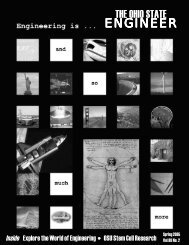Autumn 2005 Issue.pmd - Ohio State Engineer - The Ohio State ...
Autumn 2005 Issue.pmd - Ohio State Engineer - The Ohio State ...
Autumn 2005 Issue.pmd - Ohio State Engineer - The Ohio State ...
You also want an ePaper? Increase the reach of your titles
YUMPU automatically turns print PDFs into web optimized ePapers that Google loves.
<strong>The</strong> he Power of<br />
by sarah zaremba<br />
Music<br />
er of<br />
<strong>The</strong> image of an expectant<br />
mother placing headphones<br />
on her bulging stomach so<br />
her baby can enjoy<br />
Beethoven’s 5th may seem strange, but<br />
it is quickly becoming a new<br />
phenomenon. Deemed the “Mozart<br />
Effect,” musical training and<br />
exposure have been shown to<br />
improve higher functioning<br />
capabilities of the brain:<br />
suddenly, those headphones<br />
aren’t looking quite so<br />
crazy.<br />
Studies show that<br />
music has a strong<br />
correlation with brain<br />
expansion, academic<br />
improvement, and<br />
overall good feelings.<br />
Dr. Frances Rauscher of<br />
the University of<br />
Wisconsin and physicist Dr.<br />
Gordon Shaw of the<br />
University of California led a<br />
two-year experiment with<br />
preschoolers that compared the<br />
effects of musical verses<br />
nonmusical training on intellectual<br />
growth. <strong>The</strong> growth was measured<br />
using tests that determined spatial<br />
temporal capacity, the mind’s<br />
ability to envision and rotate<br />
images. <strong>The</strong> results<br />
were impressive; the<br />
children who<br />
received musical<br />
lessons received scores<br />
that were 34 percent higher than<br />
those of children who had not received<br />
musical training. Researchers<br />
concluded that a unique function of<br />
music is to improve the higher brain<br />
functioning required for mathematics,<br />
chess, science, and engineering.<br />
In a similar study, researchers gave<br />
children at an inner-city daycare center<br />
singing and piano lessons. Before and<br />
after the experiment, the children took<br />
after the experiment,<br />
the children took tests that measured<br />
tests that measured their powers of<br />
reasoning. Six months after musical<br />
training commenced, their scores<br />
nearly doubled. <strong>The</strong> test indicated the<br />
students had a greater understanding<br />
of the way things fit together, which is<br />
equivalent to the type of reasoning<br />
that engineers or high-level<br />
mathematicians utilize.<br />
Music, like math, deals with the<br />
ability to find, follow, and remember<br />
patterns. “Playing the piano, for<br />
instance, requires you to be able to look<br />
ahead – you have to plan your finger<br />
patterns based on where you think<br />
you’re going,” said Dr. Rauscher,<br />
who is also a psychologist at the<br />
Center for Neurobiology of<br />
Learning and Memory at<br />
the University of<br />
California. “By<br />
exercising those brain<br />
patterns through<br />
music early in life,<br />
we think it’s going<br />
to have an effect on<br />
your abstract<br />
reasoning<br />
throughout life.”<br />
Rauscher claims<br />
that music does not<br />
just benefit children. In<br />
another study she conducted, it<br />
was discovered that IQ tests of<br />
college students were nine points<br />
higher when Mozart was played for<br />
ten minutes prior to the test as<br />
opposed to silence. This limited<br />
exposure to music will not transform<br />
anyone into a nuclear physicist, but it<br />
can produce beneficial short-term<br />
effects for individuals.<br />
Many schools are instituting more<br />
developed music programs to<br />
encourage the development of the<br />
brain. Some argue that funding for arts<br />
programs takes money away from the<br />
core curriculum. However, in another<br />
study conducted by Shaw, dramatic<br />
improvements in mathematical<br />
performance were seen in children<br />
who received piano instructions plus<br />
a math skills video game compared to<br />
children who had only played the<br />
game. In the autumn of 2006, a<br />
secondary school will be opening in<br />
-09-<br />
<strong>Autumn</strong> <strong>2005</strong>



